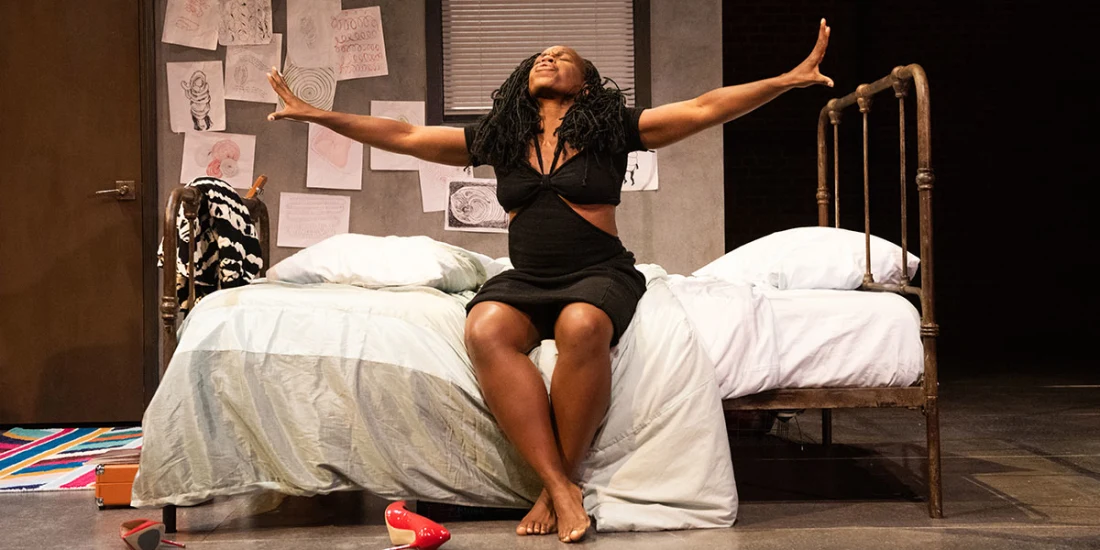'The Last of the Love Letters' review - a haunting meditation on isolation
A woman languishes in her room. One moment she's sprawled across the bed, burrowing beneath the covers, the next she bolts upright and pulls the sheets tight, trying to align her inner and outer worlds. When she opens her mouth to speak ("It's important that you know..."), it's as though an overstuffed hallway closet has tumbled open in her mind, demanding she make sense of its unwieldy mess.
We've all been there, perhaps more often in the recent past than ever before: Alone with our thoughts, poring over what we might say to someone whose absence drives us to distraction, longing desperately for connection.
Ngozi Anyanwu's The Last of the Love Letters doesn't stretch audience imagination, but rather peers into its just-vacated cell, bouncing echoes off the walls. Take it from the frequent groans of ascension murmuring through the Atlantic Theater Company's Linda Gross Theater, where the play opened off-Broadway September 13. Love Letters enacts an uncanny inversion — reuniting audiences only to transport us back to all the humors and horrors of isolation.
Anyanwu plays the woman we first encounter (identified as "You" in the program) earnestly relitigating a soured romance. Her self-assuring proclamations toe a fine line, between articulating recurrent conditions of human relationships ("I convinced myself you wanted me and not the me you created") and parroting the sort of well worn laments issuing from the Teddy Pendergrass record on the player ("Can you mourn someone who did not know how to love?").
Heartstrings are tugged and nods of agreement provoked in any case; there's a reason R&B jams resonate with so many broken hearts, allowing us to drape personal grievances across their sorrowful scaffolds.
The drama takes a more dynamic turn for the he-said side of the dialogue, which finds actor Daniel J. Watts (identified as "You No. 2") trapped in a more realized yet still-abstracted cell (scenic design is by Yu-Hsuan Chen). Watts has more time and space to expand and contract, as his character scrambles to connect with an unseen ex-flame like a frost-bitten man might circle a fire.
Both Anyanwu and Watts are magnetic performers; under Patricia McGregor's taut direction, they instantly draw viewers into lockstep with the lovers' torments. Watts, in particular, animates so many facets of a single man that it's plausible to deny he's on stage alone.
There is another figure stalking the scene — a faceless swath of PPE who breaches the man's cell at regular intervals to administer medication. It's a gesture toward a carceral (and maybe even fascist) state that envelops the exes, bearing some responsibility for their separation if not their split.
In a play otherwise built on lack of explicit context, the vagueness of its periphery raises gnawing questions that ultimately seem beyond Anyanwu's central considerations. The presence of a menacing authority could hardly feel out of place, as the state interferes with every aspect of Black life. But its actions and consequences are rendered indistinctly at a time when naming them has regained a fresh kind of power.
Love Letters follows the playwright's recent work, in making a case for theatre as a vehicle for catharsis both deeply personal to her and communal for her audiences. In The Homecoming Queen and Good Grief, in which Anyanwu also performed, she presents probing meditations on loss, family, and the vagaries of identity drawn from her own life.
Even more so than these previous plays, Love Letters taps into still-raw memories broadly shared by nearly everyone in the room — of life in isolation, at the end of a fraying rope. There's a radical kind of comfort in coming together again to find reassurance that none of us is alone in our experience, even when we are.
Photo credit: Ngozi Anyanwu in The Last of the Love Letters (Photo by Ahron R. Foster)
Originally published on
